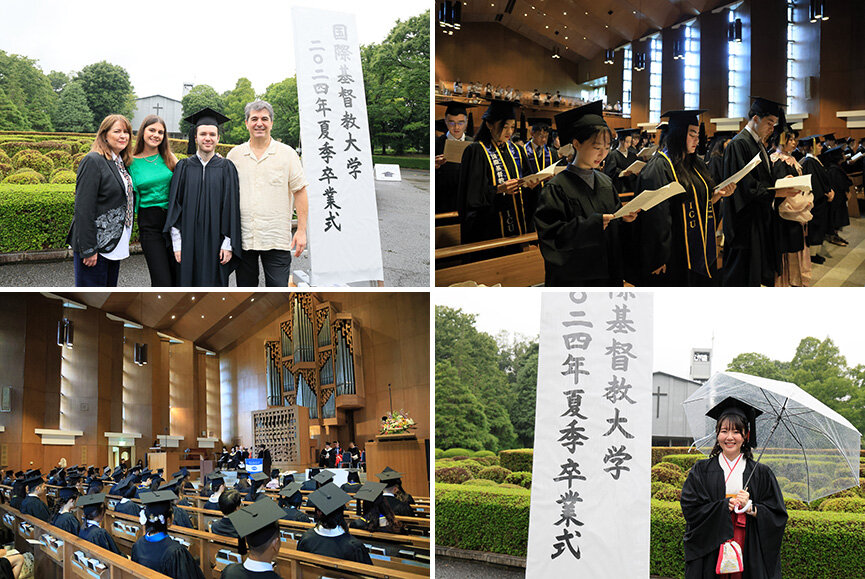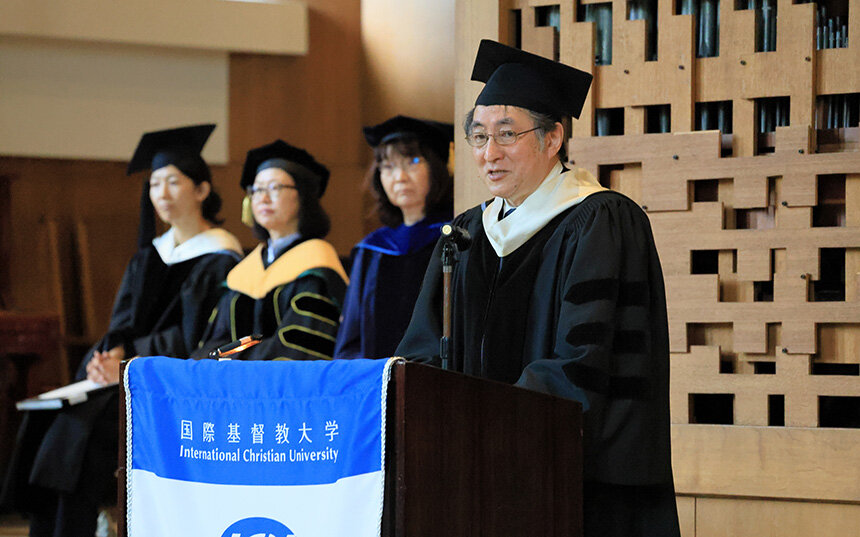NEWS
2024 Summer Commencement Ceremony
Update: July 14, 2023

120 undergraduate students and 44 graduate students graduated from ICU at its summer commencement ceremony held at the University Chapel on Friday, 12 July.
At the ceremony, each student's name was read out in keeping with tradition that has continued since the first commencement ceremony.
Eskildsen, Robert, Vice President for Academic Affairs, introduced Professor Yutaka Sato, who retired at the end of March 2024, and was awarded the title of Professor Emeritus.
Scripture Reading: Matthew 13 : 3-8
Commencement Address by Shoichiro Iwakiri, President

Congratulations to all who have completed your Bachelor of Arts program in our Division of Arts and Sciences as well as to those who have finished the MA or PhD programs in our Graduate School of Arts and Sciences and who are graduating today. I also offer my sincere congratulations to all family members, relatives and friends of our graduates.
Since it was founded 75 years ago, ICU has sent some 30,000 graduates into the world. As its most recent graduates, each of you will now take a step forward to the next stage of your lives.
Since you have completed a liberal arts education at ICU you have, of course, engaged in academic research in your specific chosen field through the writing of a dissertation.
At the same time, however, you will have taken a wide range of arts and sciences courses that have familiarized you with knowledge and ideas from a variety of other disciplines outside of your chosen field. In this way, you have developed a universal character of thought that is not limited to any one speciality.
A person who held this way of knowledge in high regard was the 17th century thinker and scientist, Blaise Pascal. His ideal was not of someone who knew everything in a limited field in which they excelled, but could not talk to others about anything else, but of someone who could talk about a wide range of topics, and could dialogue about a wide variety of topics. He qualified this type of being with the expression "les gens universels" (universal people).
Pascal says in his ''Pensées'' that it is better to be one of the "people with universal minds" than to be labeled a mathematician or a poet with a single speciality by others in a group of people.
Let me quote some of his phrases:
"People with universal minds are not described as poets or mathematicians, etc."
"We must be in a position to say not: he is a mathematician, or a preacher, or eloquent, but he is a man of the world. This universal quality is the only one that appeals to me."
(Translated by Martin Turnell)
Does this mean that expertise is unnecessary? Perhaps not, because Pascal also says that, when professional matters are discussed, you must be someone who can use your expertise to make judgments and evaluations, and be recognized by others as someone who can do so.
"It is a bad sign when a man (of whom we say ''he is a very clever poet) is not asked to give his judgment on some verses. "
(Translated by William Trotter)
The Pascalian ideal is to be able to express one's thoughts as a universalist on general topics, but also to be able to speak up as a specialist when the situation calls for expertise.
I believe that this is similar to the kind of knowledge that you acquire in the liberal arts.
There is no end to the learning in the liberal arts even when you have completed your Arts and Sciences degrees. You will continue to live your lives in search of answers as you face challenges and problems for which answers have yet to be discovered.
I am looking forward to your success in the global environment as a "specialist with a universal mind".
In the world today, there is a constant stream of violence and conflicts that destroys the daily lives and culture of citizens, and causes serious damage to life in Ukraine, Palestine, and many other places.
While there are such great calamities, there are also hidden violence and injustice that people are not so readily aware of, and which always exist and hinder the happiness that individuals and societies seek.
While working on your dissertation, you may have felt that your particular issues were connected to universal questions such as: How can people be happy and how can societies and cultures be enriched? With these questions in mind, you have been pursuing, with your academic backgrounds, a way to bring hope to the various levels of suffering and despair.
It is my hope that the results of such thoughts will be effectively returned to society at various levels, not only in academia but also in practice.
The days you spent at ICU will live on in each of you as very colorful and rich days. They are individual experiences, but at the same time, they are also shared days, spent on this campus, talking and discussing with each other. I believe that the impressions and experiences, both individual and shared, will illuminate and enrich your days ahead.
Please cherish the experience and friendship you have gained at ICU, and continue to flourish in whatever direction your life will take you.
Congratulations on your graduation.
Professor Emeritus
Professor Yutaka Sato
Professor Sato served ICU for over 26 years, and through his contributions as an outstanding researcher, teacher, and advisor, he has influenced and shaped the research and the experience of countless students. During his time as a faculty member at ICU he published many works in Japanese language education, linguistics, and Japanese linguistics and his scholarship had a significant influence on Japanese language studies overseas. Professor Sato not only contributed to our university as a dedicated educator and researcher, but he also provided extensive service to ICU in many capacities. In all the positions he held, Professor Sato worked diligently to improve the university's administration, operations, and education. In his commitment to the ideals of ICU in education, research and service, he has served as a role model for all of us.
